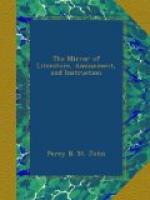In 1818, Mr. Brougham was invited to become a candidate for the county of Westmoreland, where his family have been settled for the last sixty or seventy years: he could not, however, withstand the powerful influence of the Lowther family, and thus lost his election. He made another effort, at the dissolution of parliament, consequent upon the death of George iii., but was again unsuccessful; and a third time in 1826.
We are now approaching one of the most eventful eras of Mr. Brougham’s parliamentary life: we mean his intrepid defence of the late Queen. Mr. Brougham was the first to dispatch M. Sicard, the old and faithful servant of the Queen, with the intelligence of the death of George iii. The Queen immediately replied to Mr. Brougham, that she was determined to return to England; and on February 22, 1820, Mr. Brougham received from Lord Castlereagh an assurance that no indignity should be offered to her Majesty while abroad. Mr. Brougham was now appointed her Majesty’s Attorney-General, on which occasion he was admitted within the bar, and assumed the silk gown, which was subsequently taken from him, but restored.
The Queen having arrived at St. Omer, on her way to England, Lord Hutchinson, on the part of the King, was despatched to prevent, by a liberal offer, her leaving the continent. Mr. Brougham consented to accompany his lordship, willing to co-operate in the purpose yet bound by office and by friendship to secure for the queen the best possible terms. The Queen, however, was resolved, and while the deputies were exchanging notes, her Majesty sailed for England, and proceeded to London amidst all the demonstrations of popular triumph. Mr. Brougham, with Mr. Denman, on behalf of the Queen, next met the Duke of Wellington and Lord Castlereagh, on behalf of the King, to propose measures for an amicable arrangement, but the insertion of her Majesty’s name in the Liturgy being refused, the negotiation failed. The struggle was now fast approaching. The notable green bag was laid on the table of the House of Commons, and Mr. Brougham commenced by deprecating a hasty discussion. The next day the minister developed the projected prosecutions of the government; Mr. Brougham replied, and concluded by demanding for the Queen a speedy and open trial. We need only advert to his subsequent reply to the note of Lord Liverpool, to the speech of Mr. Canning, and to the conciliatory proposition of Mr. Wilberforce. Then followed his speech at the bar of the House of Lords against the intended




